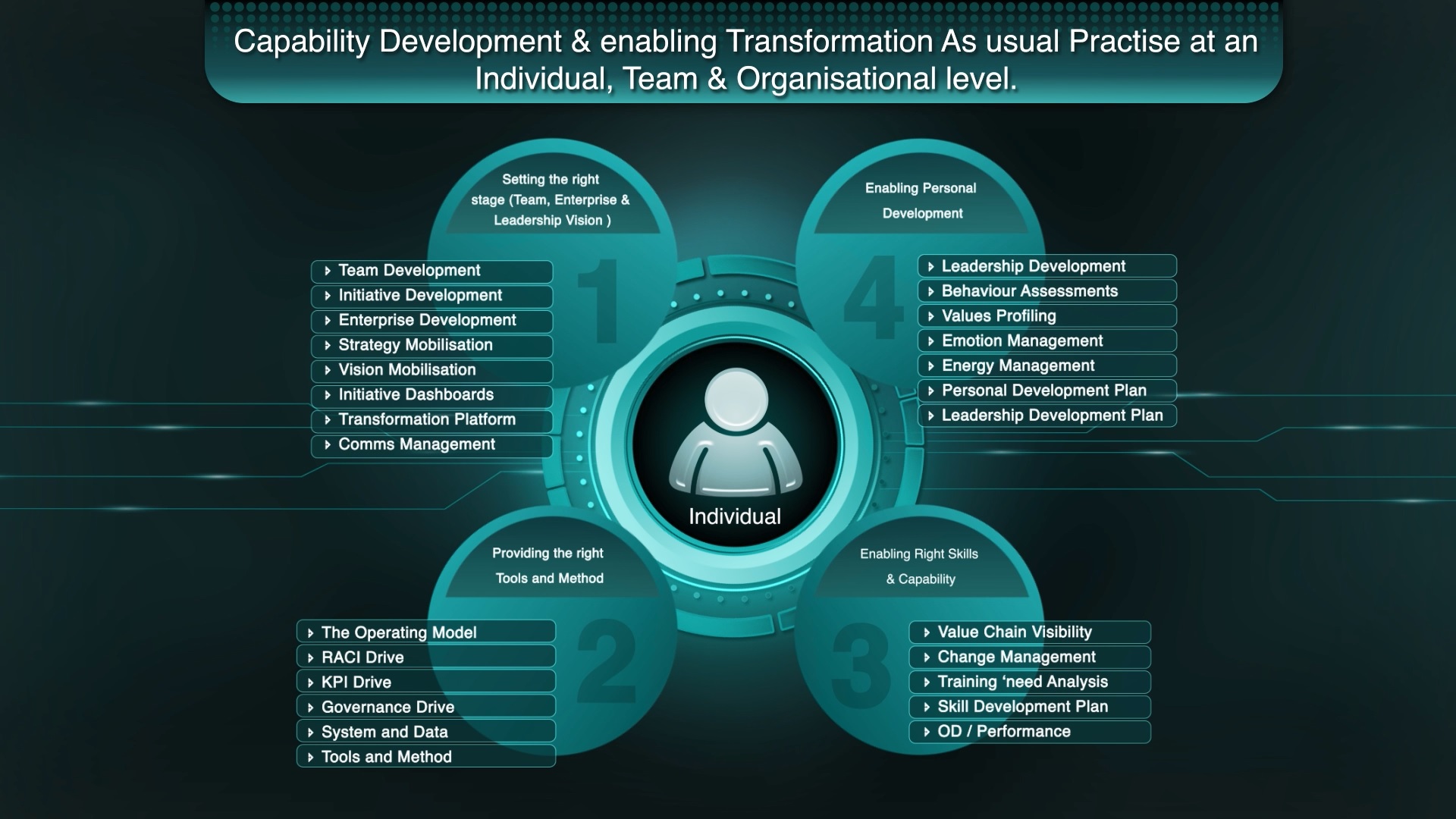Retail Conglomerate – Enterprise Business Transformation
An Introduction To Our Retail Conglomerate Platform
Modus Business Transformation Core Modules
Building, Driving and Sustaining your Business Transformation and embedding a 'Transformation As Usual' platform.
*01 - Business Model Management Hub in Modus ETP for Retail Conglomerate Enterprises
Transform your Retail Conglomerate enterprise with the Business Model Management Hub in Modus ETP. Adapt, optimize, and grow your business effortlessly.
Key Features:
• Strategic Alignment: Links retail conglomerate strategies to specific business
models and operational plans, ensuring all transformations are aligned with
the corporate vision and market objectives.
• Value Chain Optimization: Provides tools to model, assess, and optimize
end-to-end value chains, driving efficiencies across multiple retail categories
and brands within the conglomerate.
• Integrated Scenario Planning: Enables "what-if" analysis for evaluating
different business scenarios, helping conglomerates assess the impact of
market changes, investments, or new retail formats.
• Centralized Reporting Dashboard: Offers a consolidated view of business
performance, KPIs, and transformation progress across all retail brands,
facilitating informed decision-making.
Benefits:
• Operational Synchronization: Aligns strategic objectives with business
operations by linking business models to key operational processes,
ensuring consistency across departments.
• Holistic Value Chain View: Provides a comprehensive view of the entire
value chain, ensuring seamless coordination of changes across all business
areas, enhancing overall performance.
• Proactive Adaptability: Enables continuous monitoring and quick adaptation
through integrated tools, allowing businesses to respond efficiently to
evolving market conditions and internal demands.
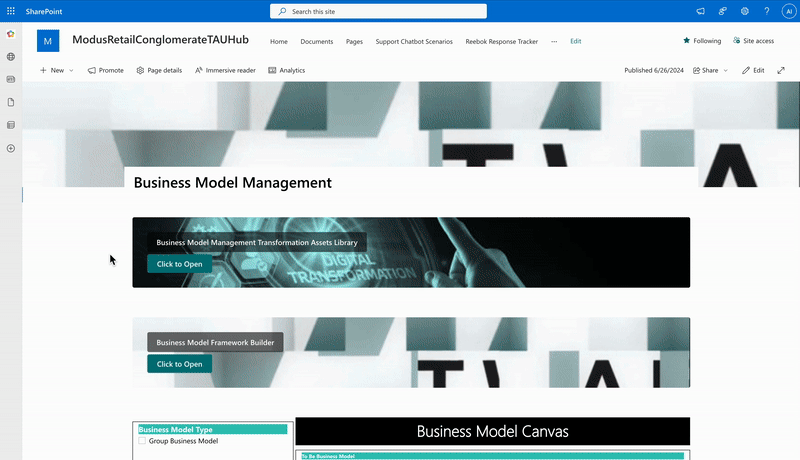
Importance:
• Holistic Visibility: Ensures that every retail unit, from luxury to everyday
goods, operates with visibility into its performance, streamlining
management and decision-making across the entire conglomerate.
• Agility and Flexibility: Supports rapid adaptation to market shifts, enabling
quick strategy pivots and product diversification across different consumer
segments.
• Operational Efficiency: Centralizes operations and business models,
reducing redundancies, optimizing supply chains, and improving overall
profitability.
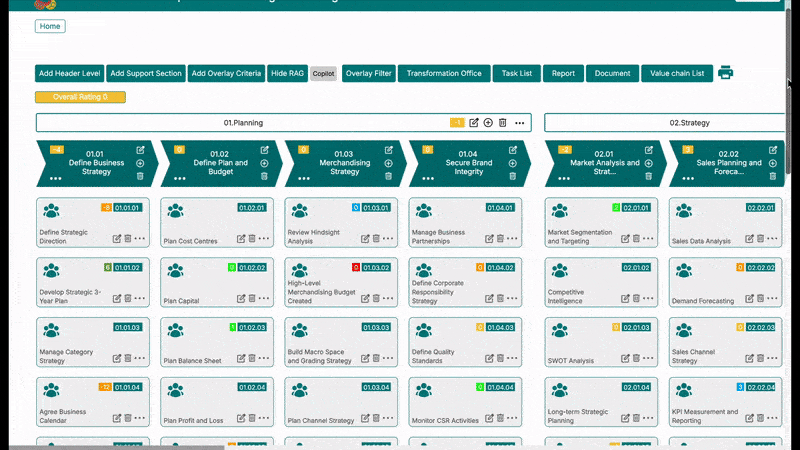
Benefits:
• Holistic Overview: Offers a complete view of the value chain, ensuring all
processes are interconnected and aligned with business objectives.
• Agility: Easily adapts to changes by identifying areas of impact across the
value chain, ensuring swift responses to market shifts.
• Improved Efficiency: Streamlines operations by mapping dependencies,
reducing inefficiencies, and optimizing resource allocation.
• Strategic Insights: Provides actionable insights through real-time data,
helping decision-makers adjust strategies effectively.
*02 - The Value Chain Modeler - Manage and Adapt
Transform your Retail Conglomerate enterprise with the Value Chain Modeler in Modus ETP. Understand, optimize, and grow your business seamlessly.
Key Features:
• End-to-End Visibility: Maps the entire value chain across multiple retail
segments, from product sourcing to customer delivery, ensuring
comprehensive oversight of each stage.
• Adaptability for Diverse Retail Brands: Customizable for different product
categories and retail formats, allowing conglomerates to manage varied
value chains for luxury, mass-market, and specialty retail brands.
• Real-Time Optimization: Monitors and adjusts processes in real-time,
enabling quick responses to disruptions, market demands, or operational
inefficiencies.
• Integrated Performance Metrics: Tracks key performance indicators (KPIs)
across all value chain segments, enabling data-driven decision-making and
continuous improvement.
Importance:
• Enhanced Efficiency: Streamlines operations across different retail units,
reducing bottlenecks, and improving coordination across sourcing,
production, and logistics.
• Flexibility and Scalability: Supports growth and diversification, enabling the
retail conglomerate to easily adapt to new markets, products, and customer
demands.
• Cost Optimization: Identifies inefficiencies and opportunities for cost
reduction, improving profit margins while maintaining service quality across
multiple brands.
*03 - The Operating Model - Organize and Sustain
Transform your retail conglomerate enterprise with the Operating Model in Modus ETP. Organize, sustain, and optimize your operations for ongoing success.
Key Features:
• Unified Structure Across Brands: Establishes a consistent operating
framework for managing multiple retail brands, ensuring alignment in
processes, policies, and governance across the conglomerate.
• Dynamic Adaptability: Supports both "As-Is" and "To-Be" models, enabling
retail conglomerates to adapt the operating model as they scale or enter new
markets.
• Comprehensive Resource Allocation: Manages resources across retail
divisions, ensuring optimal use of human capital, technology, and financial
assets.
• Real-Time Monitoring and Updates: Tracks operational performance in real-
time, providing insights for continuous improvement and adjustments to
ensure sustainability.
Benefits:
• Structured Operations: Provides a clear framework for organizing business
processes, ensuring consistency across the organization.
• Sustainable Practices: Helps maintain long-term operational efficiency by
embedding continuous improvement into daily workflows.
• Alignment with Strategy: Ensures the operating model is aligned with
strategic goals, keeping all functions focused on organizational objectives.
• Adaptability: Facilitates easy adjustments to the operating model as
business needs evolve, ensuring sustained performance over time.
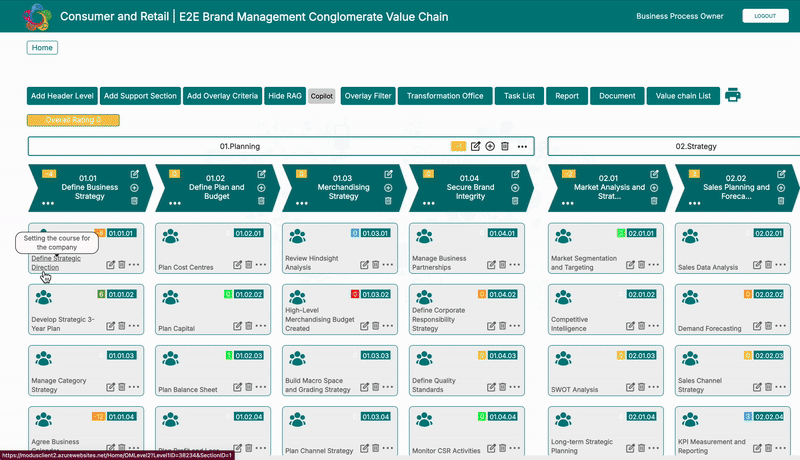
Importance:
• Operational Consistency: Ensures standardized processes across different
retail formats, maintaining brand integrity while optimizing operations for
efficiency.
• Agility in Expansion: Facilitates smooth integration of new brands or market
segments by quickly adapting the operating model to new business needs.
• Sustainable Growth: Supports long-term operational excellence by
embedding governance and performance metrics into daily operations,
ensuring both stability and adaptability as the business evolves.
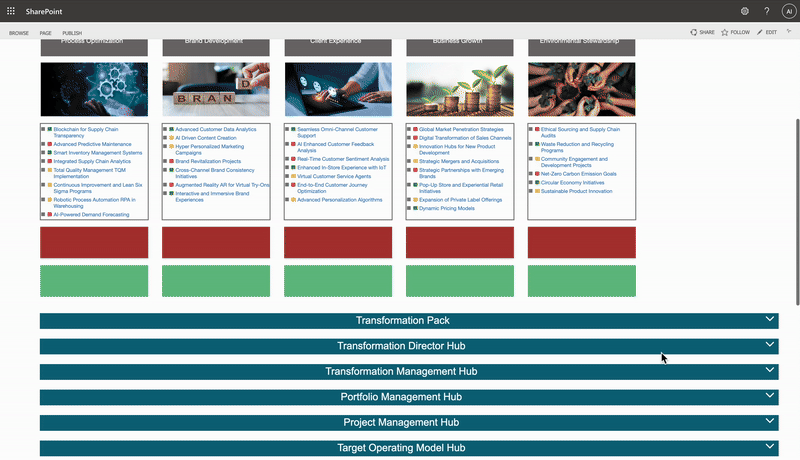
Benefits:
• Comprehensive Asset Management: Centralizes all transformation tools,
templates, and methodologies for easy access and reuse across projects.
• Portfolio Visibility: Offers clear visibility into the status of all transformation
initiatives, helping to prioritize and manage resources effectively.
• Consistent Execution: Ensures standardized processes across multiple
projects, driving consistent delivery of transformation goals.
*04 - The Transformation Assets and Portfolio Module - Discover and Transform
By leveraging the Transformation Assets and Portfolio Module, retail conglomerate enterprises can discover and transform their operations, ensuring successful execution and delivery of their transformation vision.
Key Features:
• Centralized Asset Repository: Houses over 400 transformation tools,
templates, and methodologies, tailored to support the diverse needs of retail
conglomerates.
• Portfolio Management Integration: Links transformation projects across
multiple retail brands into a cohesive portfolio, ensuring consistent oversight
and resource allocation.
• Customizable Transformation Roadmaps: Provides flexible roadmaps for
each retail unit, enabling tailored transformation journeys while maintaining
alignment with overall business goals.
Importance:
• Holistic Transformation Management: Ensures that transformation projects
across different retail brands are aligned with the overall strategy,
streamlining execution and minimizing redundancies.
• Faster Deployment: Enables rapid scaling of transformation initiatives across
the enterprise, leveraging pre-built assets and templates for accelerated
implementation.
• Risk Mitigation: Tracks project dependencies, risks, and milestones in real-
time, allowing for proactive management and minimizing disruptions.
• Enhanced Decision-Making: Provides a unified view of transformation
activities, ensuring leadership has the insights needed to prioritize and
allocate resources effectively.
• Value Chain Analysis
• Business Model Analysis
• Transformation Strategy
• Transformation Mobilisation
• Planning Management
• Transformation Log Management
• Financial Management
• Communication Management
• Operating Model Management
• Process Design Management
• IT Design Management
• Build and Test Management
• Implementation Management
• Change Management
• Personal Development Assessments
• Training Management
• Organizational Design Management
• Transformation Review
• Optimization and Governance
5. Organizational Change Management in Modus ETP
Transform your retail conglomerate enterprise with Organizational Change Management in Modus ETP. Unite, thrive, and achieve your change goals with confidence.
Key Features:
• End-to-End Change Management Framework: Provides a comprehensive
set of tools, templates, and methodologies to manage change across
multiple retail brands and functions, ensuring consistency and coordination.
• Role-Based Change Adoption: Supports change adoption at every level,
from leadership to individual employees, ensuring that the transformation is
embraced across the entire organization.
• Integrated Stakeholder Engagement: Facilitates effective communication
and engagement with stakeholders across various retail brands, ensuring
alignment and support for transformation initiatives.
• Real-Time Change Monitoring: Tracks progress and adoption metrics in real-
time, providing insights into the effectiveness of the change process and
enabling timely adjustments.
Benefits:
• Structured Change Process: Provides a clear methodology for managing
organizational changes, ensuring smooth transitions across all levels.
• Enhanced Adoption: Drives effective change adoption by aligning change
initiatives with individual roles and responsibilities.
• Integrated Tools: Offers out-of-the-box tools and templates to streamline
change management, reducing complexity and speeding up implementation.
• Sustained Transformation: Ensures long-term success by embedding
change management practices into the organization’s daily operations.
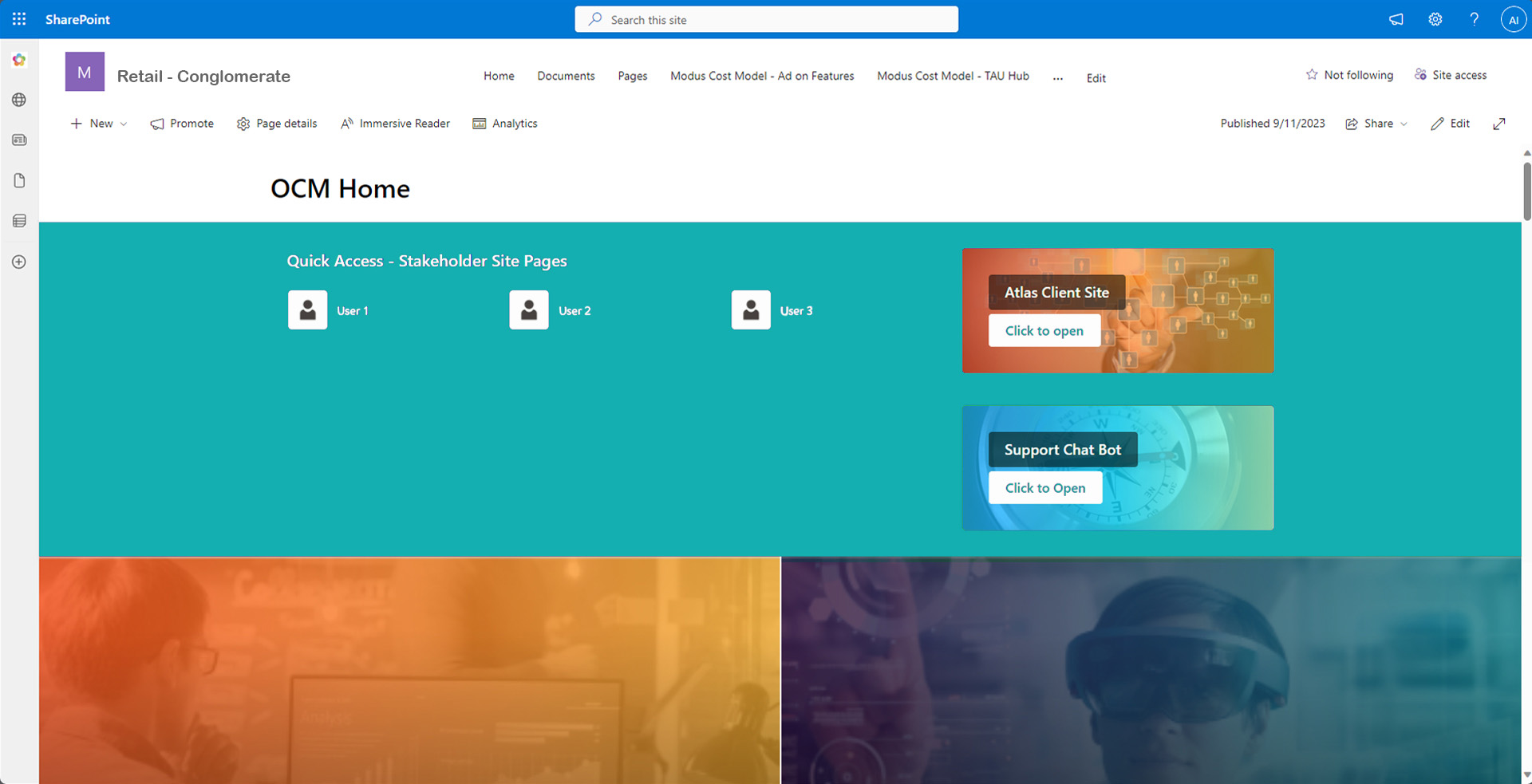
Importance:
• Seamless Multi-Brand Integration: Ensures that organizational changes are
implemented smoothly across diverse retail brands, minimizing disruption
while promoting synergy across the conglomerate.
• Enhanced Employee Engagement: Drives buy-in at all levels, reducing
resistance to change and promoting a culture of continuous improvement
across the organization.
• Sustained Transformation: Embeds change into the organization's daily
operations, ensuring that transformation becomes a core competency
(Transformation as Usual - TAU).
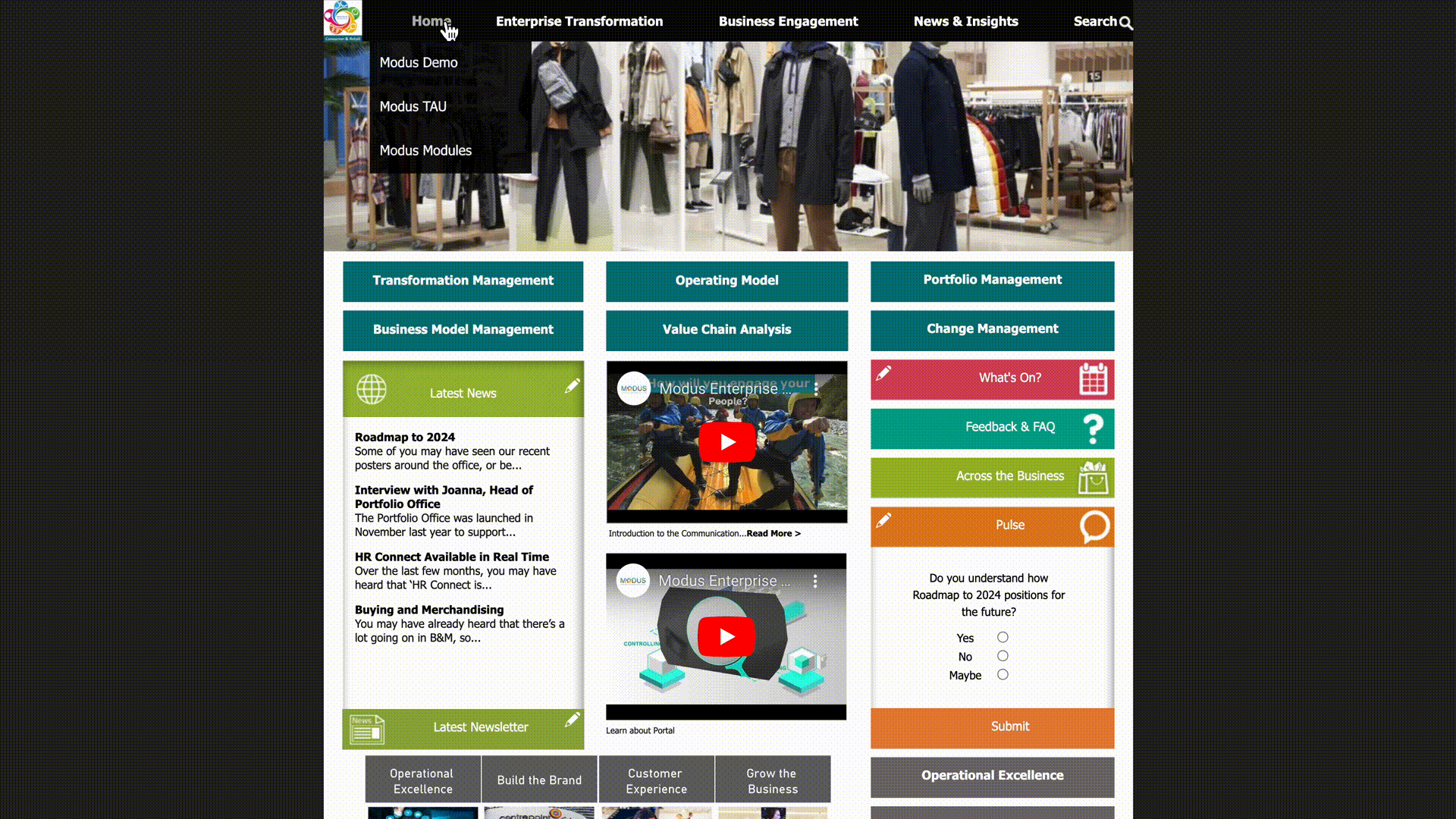
Importance:
• Improved Cross-Brand Collaboration: Enhances communication between
retail brands and functions, facilitating a unified approach to transformation
across the conglomerate.
• Increased Stakeholder Engagement: Ensures that all team members, from
executives to frontline staff, are aligned with the transformation strategy,
boosting engagement and ownership of change.
• Streamlined Information Access: Provides quick and easy access to
essential documents, reports, and schedules, reducing delays and
miscommunications during the transformation process.
• Boosted Productivity: With real-time notifications and role-based content, the
hub ensures timely actions, keeping transformation projects on track and
enabling teams to focus on high-priority tasks.
*06 - Engagement Hub - Share and Guide
Transform your retail conglomerate enterprise with the Engagement Hub in Modus ETP. Centralize communication, stay informed, and guide your teams through successful transformations.
Key Features:
• Centralized Communication Platform: Provides a single interface for sharing
transformation updates, documents, and key information across all retail
brands, ensuring consistency in communication.
• Collaborative Environment: Enables cross-functional teams and retail brands
to collaborate effectively through shared access to project updates, reports,
and key milestones.
• Role-Based Access: Customizes the information and tools available to
different user roles, ensuring that each team member receives relevant
content tailored to their responsibilities.
• Real-Time Updates and Notifications: Keeps stakeholders informed of the
latest developments in transformation initiatives through real-time updates,
reminders, and notifications.
Benefits:
• Centralized Communication: Provides a unified platform for sharing
updates and key information, ensuring all stakeholders stay informed.
• Enhanced Collaboration: Facilitates cross-team collaboration by
offering easy access to shared resources and project data.
• Real-Time Guidance: Offers up-to-date guidance and resources,
helping teams navigate transformation processes more efficiently.
Transformation As Usual Capability Model
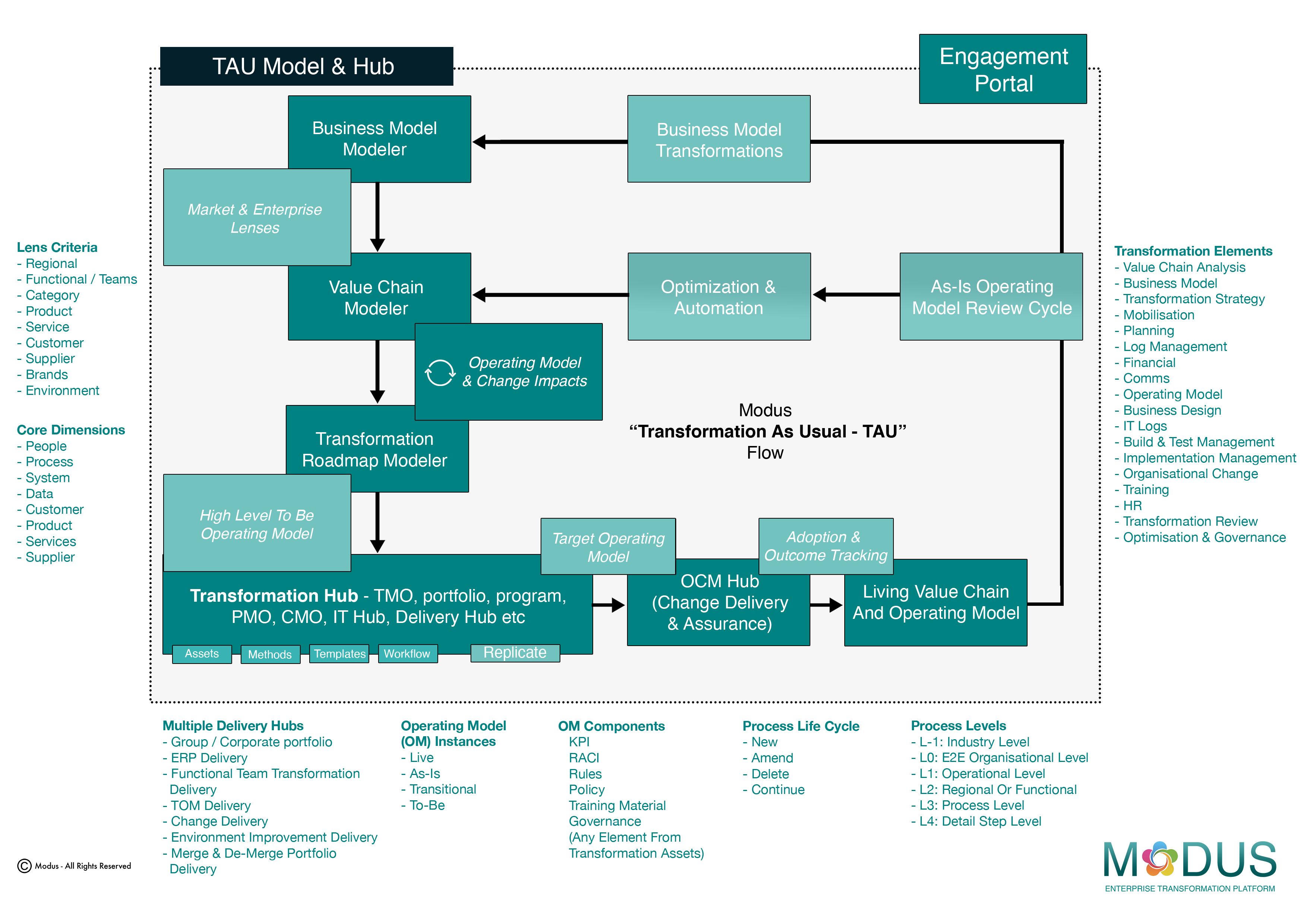
Individual and Team Capability Development
